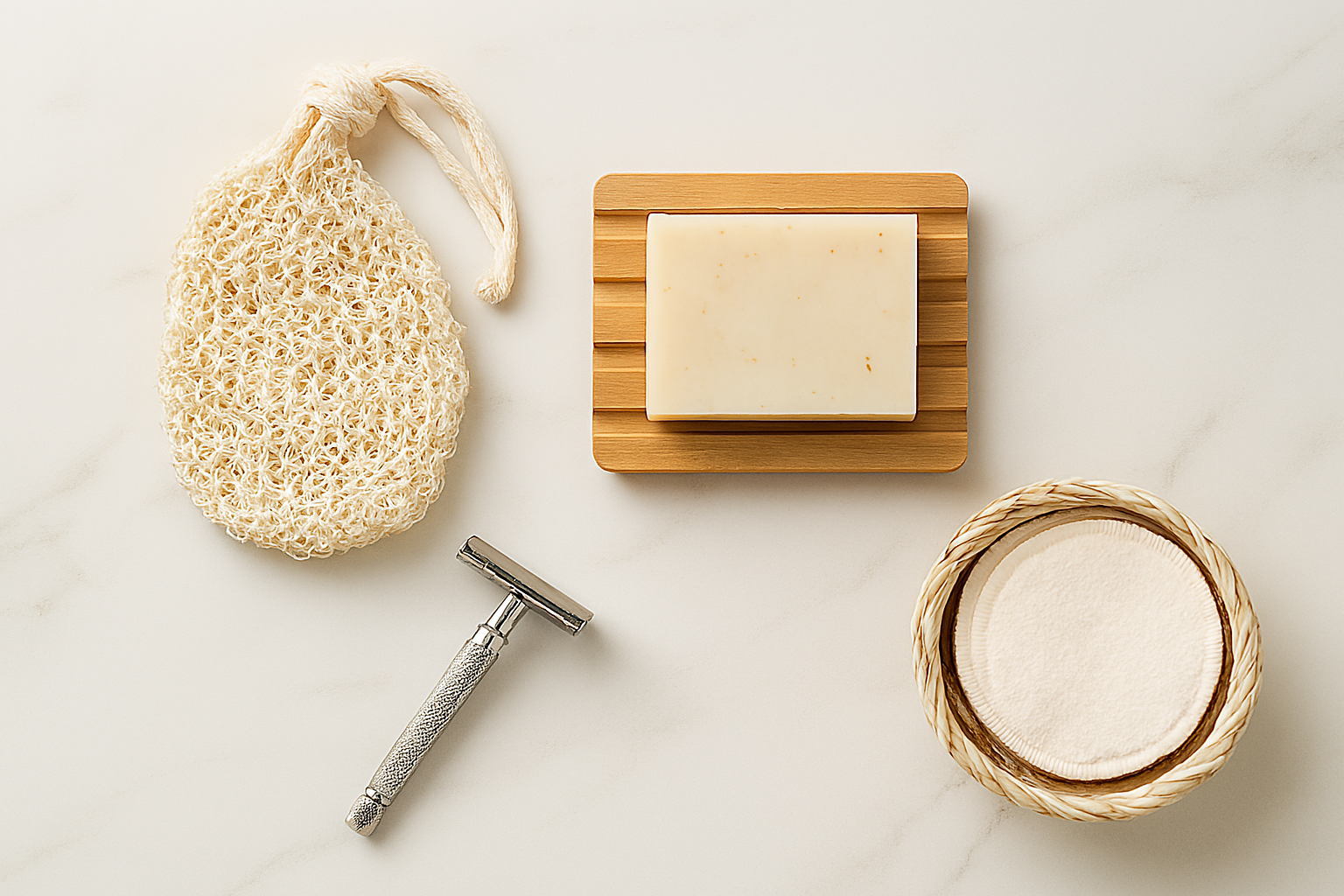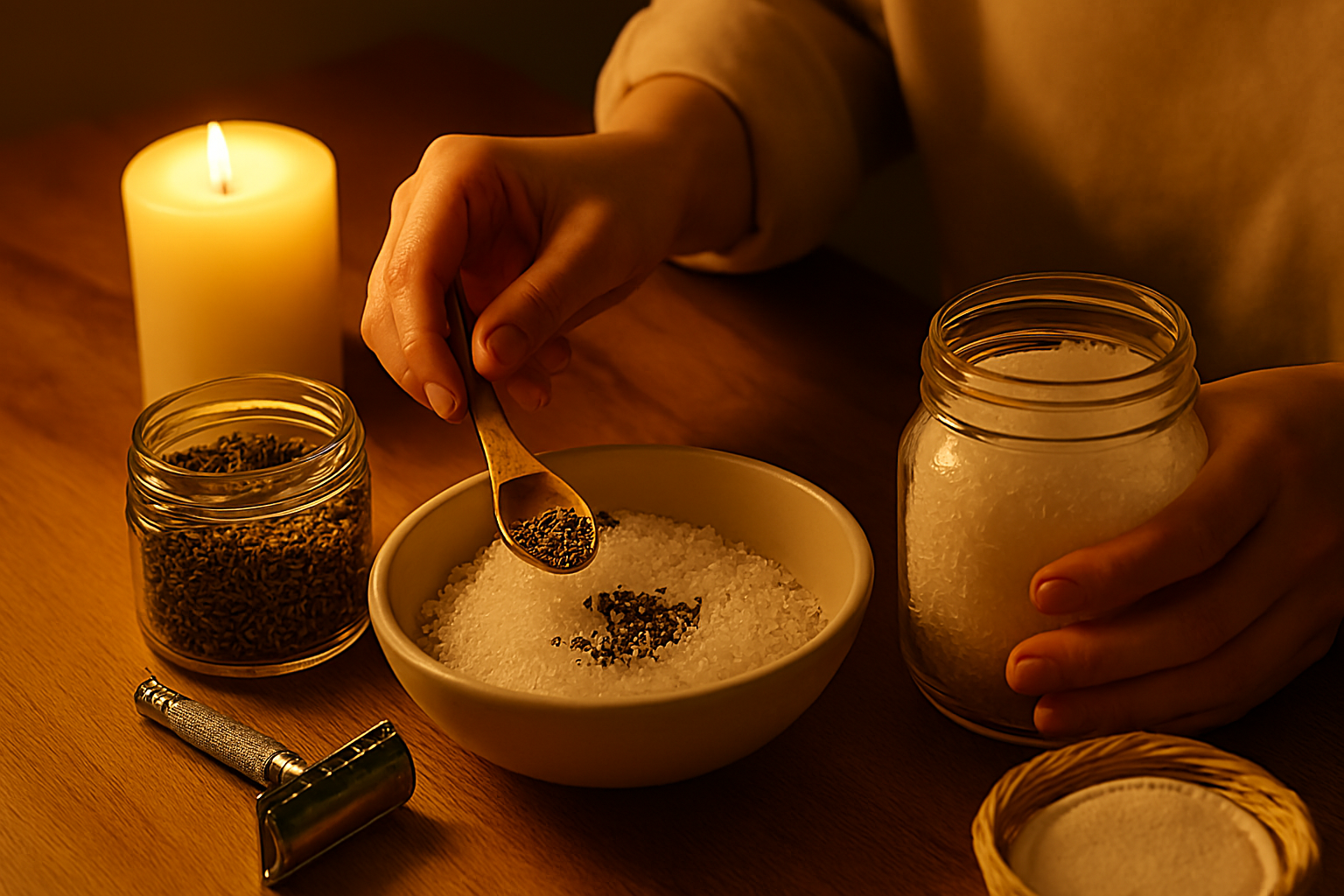8 Sustainable Self-Care Swaps for an Eco-Friendly Wellness Routine 2025

You are standing in your bathroom, ready to unwind with your favorite self-care ritual, when that familiar pang of eco-guilt hits. The single-use face mask wrapper in your hand, the plastic bottles lining your shower, the disposable cotton pads on your counter; suddenly your sacred self-care space feels like a monument to waste.
You want to nurture yourself, but not at the expense of the planet. What if you could take care of yourself and the planet at the same time? As we move through late 2025, a beautiful evolution is happening in how we approach self-care. The growing trend of sustainable wellness is not about sacrificing comfort or effectiveness. It is about discovering that the most nurturing choices for ourselves often align perfectly with what is nurturing for the earth.
Why Eco-Friendly Self-Care Matters
The personal care industry generates staggering amounts of waste. Those convenient face wipes contribute to billions of non-biodegradable items in landfills each year. The microplastics in exfoliating scrubs end up in our waterways. The beauty industry alone generates over 120 billion units of packaging annually.
But here is what is empowering: every single swap counts. You do not need to overhaul your entire routine overnight. This is not about shame; it is about recognizing that small, conscious choices can create ripple effects of positive change. When we align our self-care practices with our values, we feel good not just because we are taking care of ourselves, but because we are taking care of something bigger.
8 Easy Eco-Friendly Self-Care Swaps
Here are eight simple swaps to make your wellness routine more sustainable without sacrificing luxury.
1. Plastic Loofah to a Natural Sisal or Konjac Sponge
Plastic loofahs are made from synthetic materials that take decades to decompose. Natural alternatives like sisal sponges (from agave fibers) or konjac sponges (from the konjac root) offer gentle exfoliation while being completely biodegradable. They also have natural antibacterial properties and can be composted at the end of their life.
2. Bottled Body Wash to Bar Soap
Plastic pump bottles are rarely recyclable. High-quality bar soaps, especially those wrapped in paper, eliminate plastic entirely. Modern bars are not harsh or drying; look for those made with nourishing oils like coconut, olive, or shea butter that cater to your specific skin needs.

3. Disposable Razors to a Safety Razor
The average person throws away dozens of disposable razors each year. A safety razor, while requiring a small learning curve, provides an incredibly close shave and only requires replacing the small, recyclable metal blade. The initial investment is higher, but the long-term savings are substantial.
4. Cotton Rounds to Reusable Bamboo Pads
Single-use cotton rounds contribute to significant agricultural waste. Reusable makeup removal pads made from bamboo or organic cotton can be washed and used hundreds of times. Keep a small basket of clean pads in your bathroom and a laundry bag for used ones. This swap is both eco-friendly and cost-effective.
5. Sheet Masks to Multi-Use Facial Oils or DIY Masks
Sheet masks are essentially single-use plastic items. High-quality facial oils or simple DIY masks using kitchen ingredients offer similar benefits without the waste. A good facial oil (like jojoba or rosehip) can serve as a cleanser, moisturizer, and treatment. For a DIY option, try mixing honey with oatmeal for a gentle exfoliating mask.
6. Paraffin Candles to Beeswax or Soy Options
Many commercial candles are made from paraffin wax, a petroleum byproduct. Beeswax and soy candles burn cleaner and last longer. Beeswax candles naturally purify the air, while soy candles burn evenly and are made from a renewable resource. They create the same cozy ambiance while supporting better indoor air quality.
7. Plastic Toothpaste Tubes to Tablets or Powder
Toothpaste tubes are notoriously difficult to recycle. Toothpaste tablets or powders, often packaged in glass jars, provide the same cleaning power without the plastic waste. You simply chew one tablet and brush as normal.
8. Single-Use Bath Products to Bulk Blends
Individual bath salt packets and single-use bath bombs create unnecessary packaging. Buying bath salts, essential oils, and dried herbs in bulk allows you to create custom blends while significantly reducing waste. Store your ingredients in glass jars and experiment with your own signature soaks.

The Philosophy of Sustainable Self-Care
Beyond product swaps, the true essence of sustainable self-care lies in a shift in mindset. It encourages us to slow down and be more present. Taking a shorter, more mindful shower can feel more luxurious than a long, distracted one. Using a safety razor requires a gentle, deliberate pace. This intentionality is, in itself, an act of self-care.
Furthermore, this practice reconnects us to the natural world. Choosing products made from plants, like a sisal sponge or a soy candle, reminds us of our connection to the earth. It moves our wellness routine from a purely consumerist activity to a more holistic and grounded ritual. This deeper connection often brings a greater sense of peace and satisfaction than any product alone ever could. Embracing this philosophy transforms your routine from a list of tasks into a meaningful practice of respect for both yourself and the planet.
Creating Your Sustainable Self-Care Journey
The beauty of these swaps lies in their intention, not in perfection. You do not need to transform your entire routine overnight. Start with one swap that feels exciting and manageable. As you use up your current products, replace them mindfully with more sustainable alternatives.
This gradual approach allows you to discover what works best for your lifestyle while avoiding the waste of throwing away perfectly good items. Remember that eco-friendly self-care is about bringing more awareness to how you care for yourself and recognizing that nurturing yourself and nurturing the planet can be the same beautiful act. Your self-care ritual is ultimately an expression of love for yourself, your community, and the earth that supports us all.





